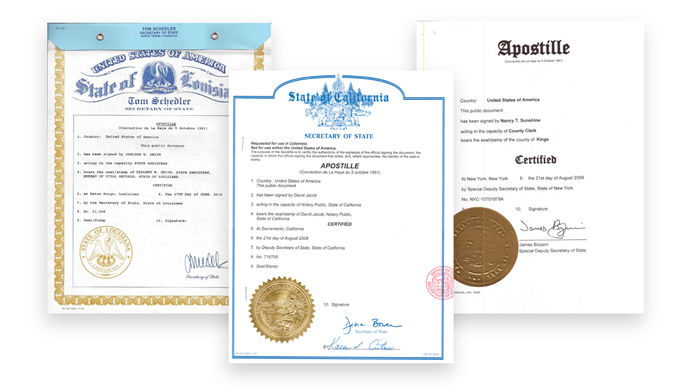Digging Into the Factors Behind the Required Requirement of Apostille Accreditation for Legal Papers
In the world of lawful paperwork, the compulsory demand of apostille accreditation has actually come to be a necessary element that substantially influences the credibility and acknowledgment of legal papers on a worldwide range. Recognizing the rationale behind this necessity entails delving into the elaborate internet of legal intricacies, historic precedents, and global arrangements that highlight the value of apostille accreditation in today's interconnected globe. By discovering the underlying factors behind this prevalent need, a clearer photo emerges of why this apparently administrative procedure holds such immense value for companies, federal governments, and individuals alike.
Historic Development of Apostille Accreditation
Just how did the idea of apostille qualification advance in time to become an important part of worldwide document validation? The historic development of apostille certification go back to the early 20th century. The need for a streamlined method of verifying files for use throughout borders emerged as worldwide profession and traveling enhanced. In feedback to this demand, the Hague Seminar on Exclusive International Legislation presented the Apostille Convention in 1961. This worldwide treaty developed a streamlined process for licensing the authenticity of papers to be identified in participant nations.
At first taken on by a couple of European nations, the Apostille Convention slowly got international approval as a result of its efficiency and performance in confirming the legitimacy of main documents. Throughout the years, the convention's reach increased as more nations signed up with, acknowledging the apostille as a widely approved form of record authentication. Today, apostille accreditation has become a conventional requirement for confirming legal documents in worldwide deals, making certain smooth interaction and legal process between countries.
Simplifying International Record Legalisation
The streamlining of global file legalisation treatments has substantially enhanced efficiency in cross-border transactions. Simplifying the process of legalizing papers for international use has actually become crucial in facilitating swift and seamless purchases between countries. Among the essential devices that have added to this simplification is the adoption of the Apostille Convention, which gives a standard method for verifying the authenticity of files across getting involved countries.
By adhering to the Apostille needs, nations accept identify each various other's public documents as legitimate without the requirement for additional legalisation. This gets rid of the extensive and usually cumbersome procedure of multiple verifications by various authorities, conserving time and sources for services and individuals engaged in international activities.

Making Sure Record Authenticity and Credibility
To ensure the credibility and legitimacy of lawful files in worldwide deals, stringent confirmation procedures are important. By requiring apostille qualification for lawful documents, authorities intend to verify the beginning of documents and verify the signatures of people included.
Additionally, verifying the credibility of lawful papers through apostille accreditation improves count on and self-confidence among celebrations participating in try this out international purchases. It provides guarantee that the files offered are real and lawfully binding, thus minimizing the risks connected with deceitful activities. Furthermore, making certain document credibility with apostille accreditation streamlines the legalisation procedure, making it a lot more trustworthy and effective for companies and individuals conducting business across borders. Eventually, by maintaining stringent confirmation criteria, apostille certification contributes to a much more transparent and protected worldwide lawful framework.

Promoting Cross-Border Legal Acknowledgment
In the realm of global transactions, the apostille qualification not just guarantees the authenticity and legitimacy of legal records but likewise plays a pivotal role in promoting cross-border lawful recognition (Houston Apostille). When legal papers bear an apostille certificate, they are readily accepted by foreign authorities without the requirement for additional confirmation. This structured procedure expedites the recognition of papers in different nations, promoting performance and minimizing governmental obstacles in legal issues that transcend national boundaries
Helping with cross-border lawful acknowledgment via apostille certification fosters trust and confidence in the authenticity of documents traded in between nations. This recognition is especially essential in scenarios such as worldwide company deals, fostering processes, or lawful process involving celebrations from different jurisdictions. By sticking to the criteria set forth by the Apostille Convention, countries concur to honor the apostille seals attached to files from various other participant nations, hence simplifying the process of lawful recognition across boundaries. Ultimately, the apostille certification works as a fundamental tool in advertising seamless international lawful participation and making certain the smooth procedure of cross-border purchases.
Compliance With International Treaty Requirements
Conformity with global treaty criteria is imperative for guaranteeing the consistent application of legal policies across taking part nations. The Apostille Convention, developed in 1961, describes the requirements for the approval of public files amongst participant countries.
The Apostille accreditation, as mandated by the treaty, acts as a guarantee of authenticity for records such as birth certifications, marital relationship licenses, court judgments, and notarized actions. This standard method helps prevent fraud and makes sure that legal documents stemming from one participant country are easily approved in an additional. Furthermore, by abiding by worldwide treaty standards, nations demonstrate their dedication to promoting the principles of transparency, trust, and check this site out collaboration in lawful matters on an international range.
Conclusion

In the world of legal paperwork, the necessary demand of apostille accreditation has ended up being an essential aspect that considerably affects the legitimacy and acknowledgment of legal papers on a global scale. Today, apostille qualification has actually come to be a standard demand for validating lawful papers in worldwide purchases, making sure smooth communication and lawful procedures between countries.
Additionally, confirming the authenticity of legal documents via apostille accreditation improves depend on and self-confidence among celebrations engaging in international deals.In the world of global deals, the apostille qualification not just makes certain the authenticity and legitimacy of lawful papers however likewise plays a crucial function in assisting in cross-border lawful acknowledgment. By adhering to the criteria established forth by the Apostille Convention, nations concur to honor the apostille seals fastened to papers from various other member nations, therefore simplifying the process of lawful why not find out more recognition throughout borders.